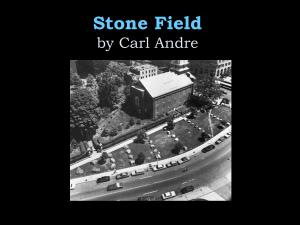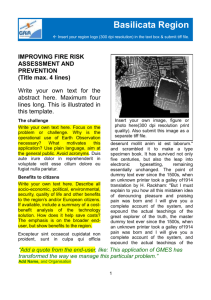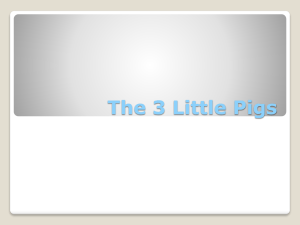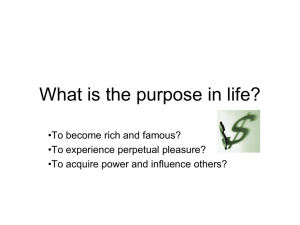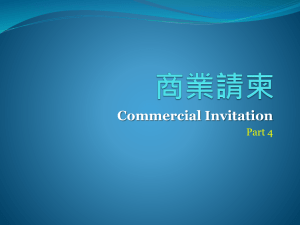第四章汉译英的理解与表达 - 精品课程
advertisement
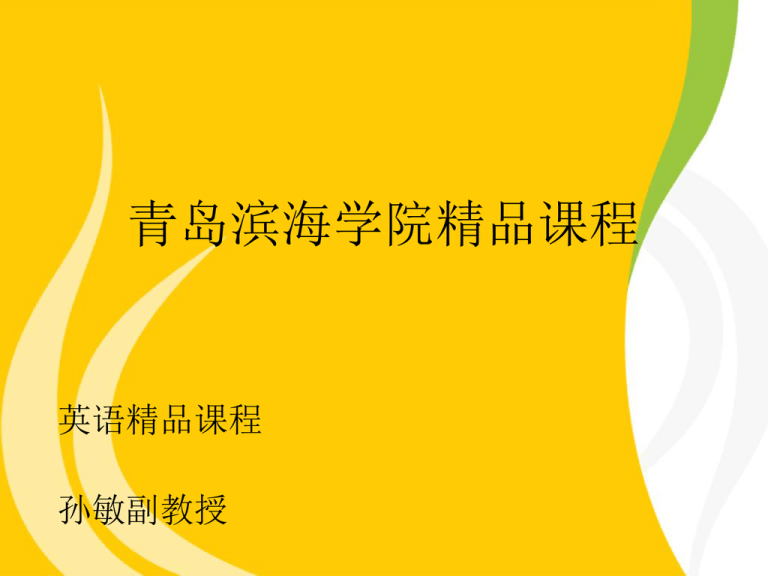
青岛滨海学院精品课程 英语精品课程 孙敏副教授 第四章 汉译英的理解与表达 第一节 汉译英中的理解问题 翻译实践 第一节 汉译英中的理解问题 一、借助语言学理论,提高对文字各种意义的识别能力 语言是一种符号。20世纪20年代,奥格登(C. K. Ogden)和理查兹(I. A. Richards)提出的符号三角理论(the semiotic triangle), 对我们理 解原文不无指导意义。 Thought or Reference (思想或所指关系) ⁄ \ …………… Symbol Referent (符号) (所指) 目录 其中,符号(Symbol)指语言成分,如词语等;所指(Referent)指外 部经验世界中的事物;思想或所指关系(Thought or Referent)指人们 大脑中的概念;虚线表示符号和所指(即语言和客观世界)之间的联系 是通过思想或所指关系(概念)实现的,是间接的关系。30年代末至40 年代初,莫里斯(Charles Morris)和卡纳普(R. Carnap)提出了符号 学的三分法,即句法学、语义学和语用学。句法学也叫符号关系学 (syntactics),研究符号与符号之间的关系,语义学(semantics)研究 符号与所指事物之间的关系,语用学(pragmatics)研究符号与符号的 使用之间的关系。这样,符号的意义就不再是单一的,而是多重性的。 确定符号的意义,除了考虑其所指意义外,还要考虑符号使用的意图 (语用意义)以及与其符号(语境)的关系。 以上论点告诉我们,认识符号的意义,必须透过现象看本质,抓住词语 的真正含义,切忌不求甚解,望文生义。 目录 (1)武松吃了道:“这酒略有点意思。”(施耐庵《水浒传》) 译文I: Wu Song drank it and said: “This wine has a little more meaning to it.” 译文II: Wu Song tried it, “Now this wine has something to it,” he said. (2) 王小玉便启朱唇、发皓齿,唱了几句书儿。(刘鹗《老残游记》 第二回) 译文I: Now open her rosy lips and her ivory white lips, her song begins! 译文II: Little Jade Wang then opened her vermilion lips, displaying her sparkling white teeth, and sang several phrases. (直译) 译文III: Little Jade then parted her lips and sang a few lines.(略译) 试比较以上三种译文。 (略) (3)(声音初不甚大,只觉入耳有说不出的妙境:)五脏六腑里, 像熨斗熨过,无一处不伏贴。(刘鹗《老残游记》第二回) 译文I: It begins low, but sweet and soothing, making the audience feel every crevice of their body and every pore of their skin feeling at ease. 目录 译文II: …and it was as though the stomach and bowels had been passed over by a smoothing iron, leaving no part unrelaxed. 译文III: All organs of the body seemed smoothed as if by an iron, each into its proper place.原文中使用了明喻,用意 在于“伏贴”。比较起来,译文I离原文字面最远,而意义却 最接近;译文III保留了部分字面的比喻,效果也较好; 译文 II最贴近原文的字面,效果却适得其反,离原文最远。五脏 六腑岂可被烙铁熨烫?所以理解和表达一定要弄清原文字句 的用意,即文字的“目的”意义,切莫从字面上对号入座。 如非要保留原文的比喻,也应在措辞上稍加调整,将“五脏 六腑”与“熨斗”分开; 译文IV: …feeling as smooth as cloth after being ironed. (4)目前我国农业的劳动生产率和商品率都比较低,抗御自然灾害的能力 还很薄弱,特别是人多耕地少的矛盾将越来越突出。(《全面开创社会 注意现代化建设的新局面》) At present, both labour productivity and the percentage of marketable products are rather low in our agriculture; our capacity for resisting natural calamities (灾害) is still limited; and, in particular, the contradiction between the huge population and the insufficiency of arable land is becoming ever more acute. 原文中的“耕地少”并非指耕地绝对数量少(small amount of), 而是 指与人口相比耕地的相对数量不足,因此译成 “insufficiency”, 表达了 原文的精神实质。 二、通过上下文,掌握隐含意义 原文所意思不一定通过具体的词汇表达,有可能体现在上下文的逻辑关 系或者全句的语气上。这时,要善于从整体上把握这种弥漫在全文中的 意义,并用适当的方式表达出来。 (1)贾母因笑道:“外客未见,就脱了衣裳,还不去见你妹妹!” (曹雪芹《红楼梦》) 显然,这里的“脱了衣裳”指脱下外套、礼服之类,不能照字面译成 “take off one’s clothes”, 所以译文是: With a smile at Pao-yu, the Lady Dowager scolded, “ Fancy changing your clothes before greeting our visitor. Hurry up now and pay your respects to your cousin.” (2)打起黄莺儿,莫叫枝上啼。 啼时惊妻梦,不得到辽西。(金昌绪《春怨》) Oh ,drive the golden orioles From off our garden tree! Their warbling broke the dream wherein My lover smiled at me.(Tr. Fletcher, A Lover’s Dream) Fletcher没有受制于“辽西”的字面,而通过意译传达了原文的真谛。 三、把握修辞特点 理解时要留意原文的感情色彩、形象色彩及语体色彩,这些联想意义多 用来达到某种修辞目的。只有透彻理解了原文的这些语义色彩,才能在 表达时通过恰当的选词或结构将原文色彩意义传达出来。 (1)忽逢桃花林,夹岸数百里中无杂树,芳草鲜美,落英缤纷。(陶 渊明《桃花源记》) All of a sudden he came upon a peach grove. For hundred of paces along both banks of the stream, the peach trees were in full bloom. No other trees were to be seen in the whole grove. The soft grass looked fresh and beautiful. Here and there falling blossoms were dancing in a thousand hues. 原文描写桃花林的胜景,“桃花林”本身就会有令人愉悦的联想意义, 再加上“芳草鲜美”、“落英缤纷”等词,更给人无比惬意的视觉感受。 方重先生的译文选用了相应的鲜活词语,充分表现了原文呈现出的美感。 有一译文用“and the falling blossoms were scattered in confusion”来表 达“落英缤纷”的景象,显然能与原文的感情色彩不符,因为 “scatter” 与 “confusion”都属于带负面色彩的词,让人觉得杂乱,产生不美的联 想。 (2)阡陌交通,鸡犬相闻。(陶渊明《桃花源记》) It was checkered with roads and paths between the fields; cock-crow and dog-bark in one village were heard in another. 原文中的“鸡犬相闻”用意在于表现乡村里平安祥和的生活气氛。如果 照字面直译九成了“鸡鸣狗叫”,在不同文化背景的英美人心目中是十 分令人不快的景象。为了避免产生这种意外的负面效应,奈达博士改译 时加上了 friendly” 一词。 The area was crisscrossed with highways and paths between the fields , and from one village to another, one could hear the friendly crowing of cocks and the barking of dogs.(Eugene A. Nida, Translating Meaning) (3)直起身又看看豆,自己摇摇头说:“不多不多!多乎哉?不多也。: (鲁迅《孔乙己》) Then straightening up to look at the peas again, he would shake his head. “Not much! Verily, not much, forsooth!” (Tr. Yang Xianyi & Gllads Yang) 原文中的孔乙己用文言文给小孩子说话,属于语体的混淆和误用。这里 作为修辞手法,使孔乙己的迂腐形象跃然纸上。译文亦选用了两个古色 古香的英文词 “verily”与 “forsooth”,贴切地传达出了原文通过语体变异 而达到的修辞效果。 (4)民主生命的进展,其经历亦复如此。(李大钊《艰难的国运与雄 健的国民》) A nation, in the course of its development, fares likewise.(Tr. Zhang Peiji) 原文的句子采用部分文言文词语,使句子正中文雅,言简意赅。译文也 相应采用类似的做法,使用了两个颇文雅庄重的词 “fare” 与 “likewise”, 并将状语部分前移,形成圆周句式,语气和节奏同原文同出 一辙。 翻译实践 一、《论语》有两句名言:“学而时习之,不亦乐乎?有朋自远方来, 不亦乐乎?”下面列出数家译文,试从理解的角度加以评论: 1. The Master said, “ Is it not pleasant to learn with a constant perseverance and application? Is it not delightful to have friends coming from distant quarters?” Confucius remarked, “ It is indeed a pleasure to acquire knowledge and, as you go on acquiring, to put into what you have acquired. A greater pleasure still it is when friends of congenial minds come from afar to seek you because of your attainments. “ (Tr. Gu Hongming) The Master said, “Is it not indeed a pleasure to acquire knowledge and constantly to exercise oneself therein? And is it not delightful to have men of kindred spirit come to one from afar?”(Tr. W. E. Soothill) The Master said, “To learn and at due times to repeat what one has learnt, is that not after all a pleasure? That friends should cone to one from Afar, is this not after all delightful?”(Tr. Arthur Waley) He said, “Study with the seasons winging past, is not this pleasant? To have friends coming in from far quarters, not a delight?” (Tr. Ezra Pound) Confucius said, “Is it not a pleasure to acquire knowledge and ,as you proceed, to put into practice what you have acquired?”(台湾1980 年英语版《论语》) To learn and to practice often what one has learnt , is it not something of a delight? To have friends from afar, is it not a pleasure?(Tr. Cao Dun ) 翻译下列句子: You can imagine how I blessed my husband for bringing friends to dinner when we had only a bit of cold meat in the refrigerator. 她不是那种小心眼儿。她胸怀宽广、心直口快、光明磊落。(bear) She is not the kind of person to bear anyone a grudge (不给予). She is frank, broad-minded, and outspoken. 这件事情你责怪他是找错了对象,他与此事毫无关系。(bark up the wrong three) In blaming him for what had happened, you were indeed barking up the wrong tree. He had nothing whatever to do with the affair. 当冰箱里只剩下一点冻肉的时候,我丈夫又带朋友来家吃饭,你可以想象 得出我是多么感激他了。(blessed) 差距甚大,尚待弥补。(make up) There is a good deal of leeway (比喻用法,落后) to make up. 你干这种事可能现在没人追究,但总有一天会找到你头上的。 (answer for) You may get away with this kind of thing now, but you will answer for it someday. 攀比之风不可取,攀比之风不可长。(the Joneses) The trend of keeping up with the Joneses is ill-advised (没脑子的) and ought to be checked. 你总喜欢横挑鼻子竖挑眼,不是见鬼吗?(holes) Isn’t it absurd (荒谬的) of you to be always picking holes. 我当时是说着玩的,他就当真了。这不正应了那句话:“言者无心, 听者有意。”(take to heart) I was only joking, but he took it to heart. Just as an old saying goes, “A casual speaker’s remark may sound deliberate to a suspicious listener” 9 她垂头丧气地回到家里,不管母亲说什么都不理会。(a deaf ear) She returned home crestfallen (垂头丧气的), turning a deaf ear to whatever her mother said. 10. 全国体育人才市场于昨日开业,这是中国体育走向商业化和专业 化的一项重要举措。(move) The national Sports Talent Fair, which opened yesterday, is an important move by China in commercializing and professionalizing its sports. END Thank you





